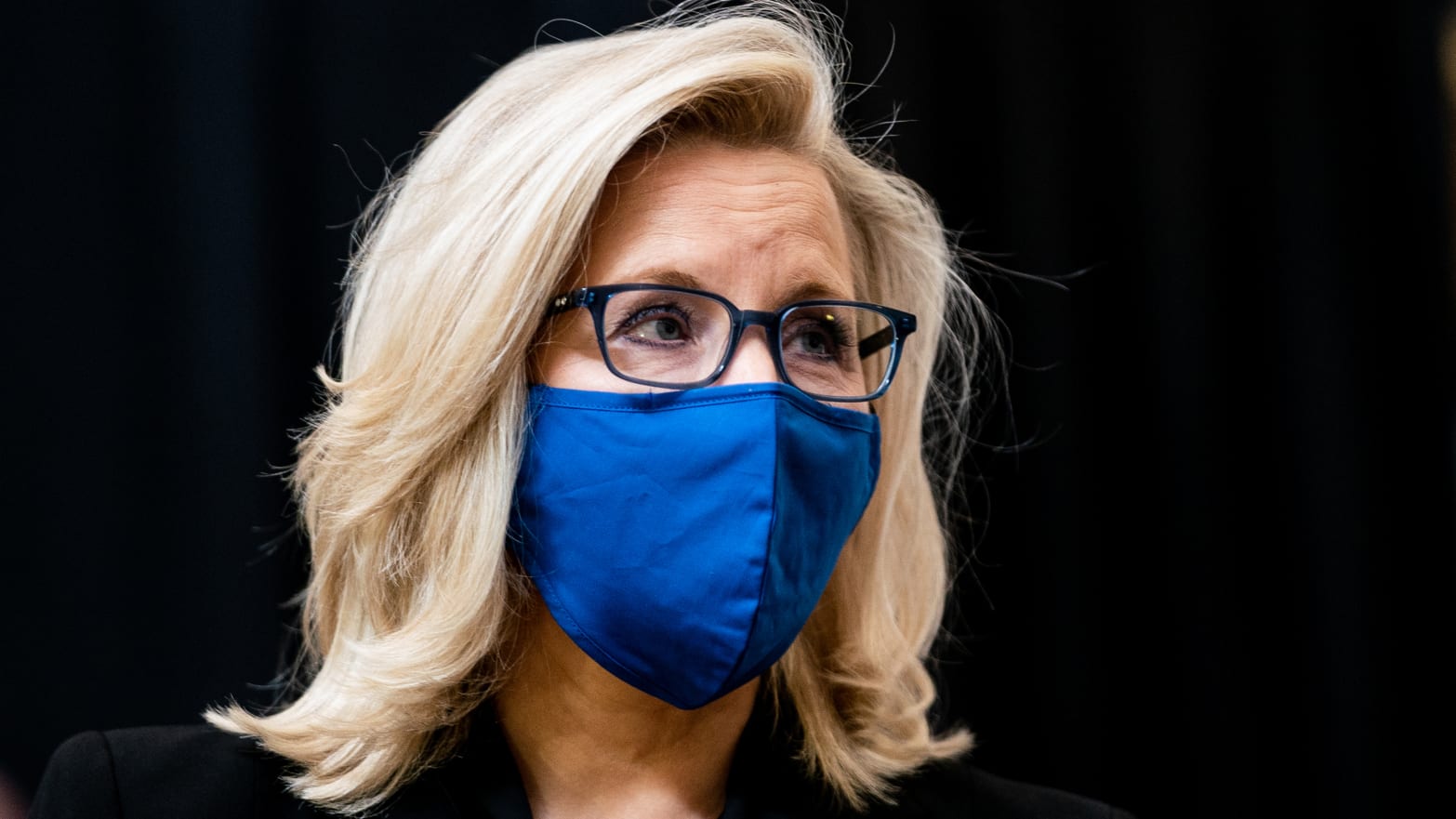House Republicans have officially removed Rep. Liz Cheney, taking the extraordinary step on Wednesday to formally strip the Wyoming Republican of her No. 3 position in the GOP conference following months of her continued and clear-eyed criticism of Donald Trump’s lies about the 2020 election.
The outcome of the vote, conducted using a quick voice vote during a closed-door meeting, was overwhelming and unsurprising.
“The ironic thing was it was to show unity," Rep. Adam Kinzinger (R-IL), a close ally, said after the vote. "It's a sad day."
Cheney, who since 2019 has been the highest-ranking Republican woman in Washington, retains her seat in the House, but she will lack the platform of House GOP leadership—a position that many of her colleagues expected, years ago, might be a springboard to something even bigger.
That part could still happen. Cheney appears poised to make even more speeches, perhaps be even more forceful, about Trump’s election lies now that she’s untethered from GOP leadership.
"I will do everything I can to ensure that the former president never again gets anywhere near the Oval Office," she told reporters after the vote.
In a speech given from the House floor on Tuesday night, Cheney teed off on the former president—calling his sustained attack on elections a “never seen before threat”—and said Republicans were going down “a path that abandons the rule of law and joins the former president’s crusade to undermine our democracy.”
“Remaining silent and ignoring the lie,” said Cheney, “emboldens the liar.”
It might have been Cheney’s strongest words yet for Trump and his influence on the party, but her consistent willingness to voice that stance is why colleagues are clamoring for her ouster. Her parting shot also amounted to one more attempt to turn the vote on her fate into a referendum on what the GOP stands for: reality, or conspiracy.
At a virtual rally on her behalf on Tuesday night, Kinzinger conceded that Cheney was “at peace” with her decision to stake her career on countering Trump, even if it means losing her post in leadership.
“We shouldn't feel bad for her,” said Kinzinger. “She’s made a very brave decision."
Three months ago, House Republicans had been willing to accommodate Cheney’s point of view. In February, she faced a revolt from a pro-Trump faction aiming to recall her after her vote to impeach Trump for fomenting the Jan. 6 insurrection. From the comfort of a secret ballot, Republicans voted to retain her by a two-to-one margin.
This time, Cheney’s expulsion had been telegraphed for days, right down to the parliamentary choreography: wary of the optics of a male-dominated party jettisoning its top-ranking woman, Rep. Virginia Foxx (R-NC) initiated the vote on Wednesday, as promised.
Ahead of the vote, some of Cheney’s allies rejected the idea that this outcome was a foregone conclusion, and emphasized that the congresswoman had been speaking with colleagues about their decision. But they also acknowledged that after weeks of this drama playing out in public view, there were probably few members in the undecided column on such a fundamental question of the party’s future.
“She’s not asking for votes,” said one source close to Cheney’s orbit, on Tuesday. “It’s so clear what’s on the line.”
That much was clear to all sides by the time Republicans filed into their meeting on Wednesday. Since surviving the February recall attempt, Cheney has openly declared Trump has no place as a leader of the Republican Party or the country after Jan. 6, even doing so while shoulder-to-shoulder with House Minority Leader Kevin McCarthy (R-CA) at press conferences.
To McCarthy and other Republicans, Cheney’s steady drip of criticism became a distraction for the party and a threat to their chances of retaking the House majority in 2022. Even those Republicans who joined Cheney in voting to impeach Trump had lost patience with her and began complaining to leaders, The Daily Beast reported last week.
“Liz didn’t agree with President Trump’s narrative and she was canceled,” Rep. Ken Buck (R-CO) said, summing up the dynamic to reporters after the vote Wednesday.
Cheney’s allies, however, insist that she didn’t do anything different—her party did. After a brief chill post-Jan. 6, Trump’s hold on the party solidified. McCarthy worked to get back into Trump’s good graces, flying to Mar-A-Lago to patch things over and to announce the ex-president would be playing a key role in the party’s 2022 campaign.
During the Tuesday rally for Cheney, Kinzinger charged it was McCarthy who had changed his tune, not Cheney. “Liz is being removed because she’s very consistent,” he said. “Liz’s honesty has made it uncomfortable for members of Congress who want this to go away.”
From this point of view, it’s not Cheney who proved unable to let go of the 2020 election—it was the GOP leadership and party mainstream obsessed with re-litigating it in order to please the ex-president and his conspiracy-saturated base. Her allies laugh at the idea that the party will finally move on from the election-fraud morass—and escape tough questions about their enabling of the Big Lie—once Cheney is out of power.
But the job Cheney held, conference chair, is all about shaping and driving messaging, relentlessly attacking Democrats, and rallying around GOP leaders. Even her defenders concede that was no longer possible, given the clear reality of Trump’s hold on the GOP.
“The conference chair position is basically a partisan hack position,” said one House Republican aide. “And Cheney probably wasn’t the best fit for that anymore—even if what she was saying was 100 percent true.”
With fealty to Trump and election skepticism now at the core of the GOP, Cheney’s reliable messaging on other issues was easily drowned out by her criticism of Trump. She has, for example, vocally pushed back on President Joe Biden’s agenda, slamming his moves to restrict oil and gas drilling and headlining press conferences torching his handling of migration at the southern border.
Republicans say they want these issues at the forefront of their 2022 midterm campaign but nevertheless believe Cheney’s stance on a separate issue robs her of GOP credibility across the board.
Ironically, Cheney has more traditionally conservative credentials than the lead candidate angling to replace her, Rep. Elise Stefanik (R-NY), who has compiled a moderate voting record since she was first elected in 2014. But Stefanik has auditioned for Cheney’s job by throwing out red meat to the MAGA base. Last week, she appeared on Steve Bannon’s radio show and supported Arizona’s conspiracy-fueled audit of the 2020 election results that the state’s Republican officials all certified months ago.
McCarthy officially backed Stefanik, long seen as a rising star in the party, ahead of the vote to recall Cheney. A separate vote to fill the vacancy is expected soon, probably in the coming days.
That vote is shaping up as a coronation for Stefanik, but the internal drama may not be over yet. Some conservatives are suspicious of the New York Republican’s moderate record and are urging McCarthy to pump the brakes. In a memo first reported by Politico, Rep. Chip Roy (R-TX) warned his colleagues about “the message Republican leadership is about to send by rushing to coronate a spokesperson whose voting record embodies much of what led to the 2018 ass-kicking we received by Democrats."
Meanwhile, Cheney’s political future, once considered perhaps the brightest in the House GOP ranks, is now murkier than ever. A year ago, Rep. Jim Banks (R-IN) told The Daily Beast that he was “thrilled” at the thought of Cheney becoming the first Republican woman to ascend to the House speakership—an opinion shared by plenty of his colleagues. Now, he’s a leader of the push to oust Cheney, and he told Fox News on Sunday that she had “failed” in her job and had become a distraction for the party.
Cheney’s allies insist the battle is not over, and that she will continue to have influence in trying to win back the party from Trump. But her supporters at Tuesday’s virtual rally included critics previously chewed up and spit out by the same forces that did so to Cheney: former Rep. David Jolly, who left the GOP in 2018 over Trump objections, and former Rep. Denver Riggleman, a Virginia Republican who lost a primary in 2020 to a hardcore Trump supporter.
One supporter, former Rep. Joe Walsh—a Trump backer turned critic—worried that a similar fate could befall Cheney.
“I worry about her getting reelected,” said Walsh. “This is a long fight.”


